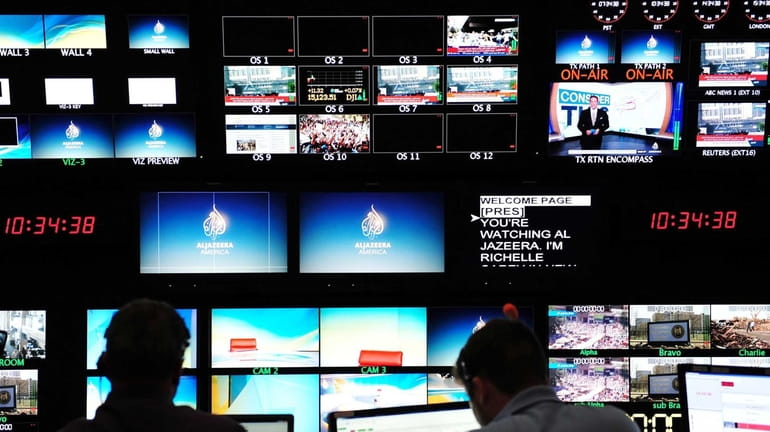May: What's wrong with Al Jazeera America? A lot.

The main control room in the new Al Jazeera America television broadcast studio in New York. (August 16, 2013) Credit: Getty Images
Al Jazeera America launched last week. The new television channel features such broadcast luminaries as Soledad O'Brien, Joie Chen, Sheila MacVicar, John Seigenthaler, David Shuster and Ali Velshi.
Paul Beban, a regional correspondent, told the Denver Post's Joanne Ostrow that he "defuses suspicions about Al Jazeera America with 'a little bit of humor and friendliness.' " For example, when asked whether he is required to wear a burqa, Beban replies: "You know what? They were out of 42 long."
Such drollery notwithstanding, "some of the viewing public is more than a little wary of the latest entry in the field," Ostrow notes. Why do you suppose that might that be? Perhaps start with the fact that Al Jazeera America, like its well-established Arabic-language sister station, Al Jazeera, is owned and lavishly funded by "the royal family of Qatar," the politest way of describing the petroleum-rich emirate's dynastic dictators -- who also happen to be funders of Hamas, a U.S. government-designated terrorist group, and the Muslim Brotherhood.
Sheikh Hamad bin Khalifa al-Thani had been the tiny nation's ruling emir for only a year when he founded Al Jazeera in 1996. The network quickly became -- in the words of Walter Russell Mead, the James Clarke Chace Professor of Foreign Affairs and Humanities at Bard College -- Qatar's "press poodle."
Shibley Telhami, Anwar Sadat Professor for Peace and Development at the University of Maryland, observed: "Even as Qatar emerged as a key ally of the United Sates, Al Jazeera gave voice to Osama bin Laden ..."
MacArthur Fellowship-winning professor Fouad Ajami came to the same conclusion in an appraisal of Al Jazeera for The New York Times. The network, Ajami wrote, "is not subtle television." Among the examples he cited: a documentary that presented Che Guevara as a "romantic, doomed hero." The point, he said, was to evoke a similar view of Osama bin Laden, "the Islamic rebel." For years, Al Jazeera has featured Sheikh Yousuf Al Qaradawi, star of the hit show "Sharia and Life." Qaradawi has praised Imad Mugniyah, the terrorist mastermind behind the 1983 suicide bombings in Beirut, in which 241 U.S. Marines and other service personnel were killed.
A few years back he issued a fatwa saying that the "abduction and killing of Americans in Iraq is a (religious) obligation." Qaradawi favors the "spread of Islam until it conquers the entire world ... (marking) the beginning of the return of the Islamic Caliphate." He has extolled Hitler, saying the Fuhrer "managed to put (Jews) in their place. This was divine punishment for them. Allah willing, the next time will be at the hands of the believers (Muslims)."
Al Jazeera America's reporters, producers and publicists will protest that their operation is separate from Al Jazeera Arabic. But are they? The two Al Jazeeras have the same owners (formally, the Al Jazeera Media Network), who also provide the funding. I'm not suggesting Al Jazeera America will be an echo of Al Jazeera. I am suggesting that it will have a mission, drive specific messages and observe certain prohibitions.
Soledad, Joie, Sheila, John, David, Ali: I'm sure you've heard the rumors that Qatar is financing al-Qaida groups in Syria. What would your employers say if you proposed to investigate? And how about the treatment of foreign workers in Qatar? Are you not curious to know if reporting on that situation would be considered out of bounds?
I suspect Al Jazeera America will be subtle television. Christopher Harper, a longtime print and broadcast journalist, now a professor at Temple University, spent many long hours watching AJAM's first week of broadcasts -- widely advertised in other media, e.g.: "Support for NPR comes from Al Jazeera America." He found the coverage had "an anti-American undercurrent."
For example, there was a story on the force-feeding of hunger strikers at a California prison and one about "Bangladeshi workers in allegedly substandard conditions making pants for Old Navy, which again allegedly ended up in the United States." (And, if Old Navy's executives in the U.S. had said: "But our Bangladeshi division is separate from our division in the U.S.!," would AJAM's reporters have bought it?)
AJAM was available last week in about 48 million households via Comcast, Verizon, FiOS, DirecTV and Dish Network. AJAM's executives are not satisfied. Last week, their attorneys filed a lawsuit to compel AT&T to carry the network, in order to "enforce Al Jazeera America's rights." A media operation owned by a foreign dictator now has the "right" to be in your living room? Stay tuned.
Better yet: Change the channel.
Clifford D. May is president of the Foundation for Defense of Democracies, a policy institute focusing on national security.
